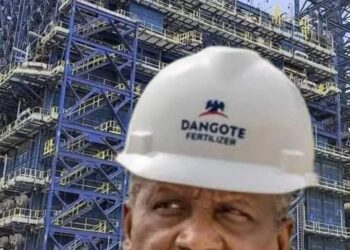Nigeria, a nation abundant in oil resources, finds itself in the throes of a fuel crisis exacerbated by rising prices and subsidy removals. As citizens grapple with the harsh realities of soaring costs and economic instability, the Dangote Refinery emerges as a beacon of hope. OLUMIDE OLUSEGUN writes
Nigeria, a nation rich in oil, has long been plagued by the paradox of being one of the largest oil producers in Africa while grappling with chronic fuel shortages and fluctuating prices. The recent hike in fuel prices has rekindled a sense of urgency and desperation among citizens, prompting widespread protests and public outcry.
As the country navigates this crisis, many looked toward the Dangote Refinery, a monumental project that promised to transform Nigeria’s fuel landscape. However, the reality is complicated, and while the refinery may hold the key to alleviating some of these issues, the timeline and challenges ahead suggest that immediate relief is unlikely.
The Current Fuel Crisis
On May 29 2023, Nigeria experienced another significant changes in the petroleum sector following the announcement by President Bola Tinubu about the immediate removal of the subsidy. In his words, the President said, “Subsidy is gone,” a move that sent shockwaves through an already struggling economy.
The price of petrol began to surge since then, leading to skyrocketing transportation costs, inflationary pressures on basic goods, and widespread public discontent. For many Nigerians, fuel is not just a commodity but a lifeline that impacts their daily lives, livelihoods, and overall economic stability.
The government’s decision to increase fuel prices was ostensibly driven by the need to remove subsidies, a move aimed at reducing fiscal burdens. However, critics argue that the timing of the hike was poorly managed, coming at a time when the average Nigerian is already grappling with rising costs of living and stagnant wages. Protests erupted across major cities, with citizens demanding accountability and immediate solutions.
Fuel subsidy have long been a contentious issue in Nigeria, often viewed as a double-edged sword. While they provide temporary relief to consumers, they also drain government resources and encourage corruption. The removal of these subsidy has been seen as necessary for economic reform, but it also exposes the vulnerability of the populace, especially those living below the poverty line.
The current crisis is exacerbated by a combination of factors, including global oil price fluctuations, currency devaluation, and supply chain disruptions. For ordinary Nigerians, these dynamics create a perfect storm, where rising fuel prices ripple through the economy, affecting everything from food prices to transportation fares.
The Promise of the Dangote Refinery
In the midst of this turmoil, the Dangote Refinery emerged as a beacon of hope for many Nigerians. Spearheaded by billionaire businessman Aliko Dangote, the refinery is touted as one of the largest in Africa, with a capacity of refining 650,000 barrels of crude oil per day.
The refinery which was inaugurated on 22 May 2023 in Lekki, began operations on January 12, 2024 with hopes to not only meet domestic fuel demands but also export to neighboring countries, potentially transforming Nigeria into a self-sufficient energy hub.
The refinery’s potential to reduce the country’s dependence on imported fuel is particularly compelling. Nigeria has historically relied on imports to meet its fuel needs, a situation that has made the country vulnerable to external shocks and price volatility. If operationalised successfully, the Dangote Refinery could change this narrative, offering a more stable and predictable fuel supply.
Beyond addressing fuel shortages, the Dangote Refinery is expected to drive economic transformation in Nigeria. The project is anticipated to create thousands of jobs, both directly and indirectly, providing much-needed employment opportunities in a country with an unemployment rate that hovers around 33%.
According the company in July, 2023, over 30,000 Nigerians were engaged among the skilled workforce for the project. This job creation could stimulate local economies, particularly in the Lagos region where the refinery is located.
Furthermore, the refinery could attract foreign investment, bolstering Nigeria’s position as an attractive destination for business and commerce. As the global energy landscape evolves, with a focus on sustainability and innovation, the refinery could also serve as a model for future industrial projects in Nigeria.
Challenges Ahead
Despite the optimism surrounding the Dangote Refinery, there have been several challenges since it began operation.
One of the major concerns is the the Nigerian government’s regulatory framework which can be unpredictable, leading to uncertainties for investors. Issues such as bureaucratic red tape, policy inconsistency, and corruption continue to plague the business environment, raising questions about the long-term viability of the refinery as a solution to Nigeria’s fuel crisis.
Also, the Refinery has started supplying Premium Motor Spirit, popularly called petrol, to some oil marketers directly without recourse to the Nigerian National Petroleum Company Limited allowing marketers to determine the cost.
There is however no hope that with the refinery the petrol pump prices which is currently at N998 and N1,030 would be reduced by the marketers.
The continued increase in the pump price since the establishment has defeated the hopes of many that the refinery would crash the price of fuel nationwide and many are already nursing the sense of betrayal.
As Nigeria grapples with its fuel crisis, the path forward requires a multifaceted approach. While the Dangote Refinery offers a glimmer of hope, it is not a silver bullet. The government must address the underlying issues of corruption, infrastructure deficits, and regulatory challenges to create an environment conducive to growth and stability.
Additionally, implementing social safety nets to cushion the effects of fuel price hikes on the most vulnerable populations is essential. This could include targeted cash transfers, subsidy for essential goods, or investments in public transportation to alleviate the burden on daily commuters.
 National Telescope national telescope newspaper
National Telescope national telescope newspaper



